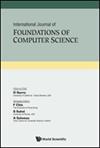由级联积引起的语言状态复杂性的范围-一元情况
IF 0.6
4区 计算机科学
Q4 COMPUTER SCIENCE, THEORY & METHODS
International Journal of Foundations of Computer Science
Pub Date : 2023-03-18
DOI:10.1142/s0129054123430049
引用次数: 1
摘要
我们研究了由两个最小确定性有限自动机的级联积所产生的语言的状态复杂性,它们分别具有[公式:见文]和[公式:见文]状态。更准确地说,我们研究了级联积运算的幻数问题,并展示了当左自动机是一元的情况下,即只有一个单字母字母表时,可以产生的复杂性范围。在这里,我们区分了所涉及的自动机是重置自动机、置换自动机、置换-重置自动机,以及对其结构没有任何限制的情况。结果表明,获得的级联积状态复杂性的图像是多种多样的,对于所有情况,除了左边的自动机是一元排列(重置)或没有结构限制的确定性有限自动机,右边的是重置自动机或没有结构限制的确定性有限自动机,我们能够识别无法达到的状态大小-这些数字被称为“魔法”。本文章由计算机程序翻译,如有差异,请以英文原文为准。
The Range of State Complexities of Languages Resulting from the Cascade Product — The Unary Case
We investigate the state complexity of languages resulting from the cascade product of two minimal deterministic finite automata with [Formula: see text] and [Formula: see text] states, respectively. More precisely we study the magic number problem of the cascade product operation and show what range of complexities can be produced in case the left automaton is unary, that is, has only a singleton letter alphabet. Here we distinguish the cases when the involved automata are reset automata, permutation automata, permutation-reset automata, or do not have any restriction on their structure. It turns out that the picture on the obtained state complexities of the cascade product is diverse, and for all cases, except where the left automaton is a unary permutation(-reset) or a deterministic finite automaton without structural restrictions, and the right one is a reset automaton or a deterministic finite automaton without structural restrictions, we are able to identify state sizes that cannot be reached — these numbers are called “magic.”
求助全文
通过发布文献求助,成功后即可免费获取论文全文。
去求助
来源期刊

International Journal of Foundations of Computer Science
工程技术-计算机:理论方法
CiteScore
1.60
自引率
12.50%
发文量
63
审稿时长
3 months
期刊介绍:
The International Journal of Foundations of Computer Science is a bimonthly journal that publishes articles which contribute new theoretical results in all areas of the foundations of computer science. The theoretical and mathematical aspects covered include:
- Algebraic theory of computing and formal systems
- Algorithm and system implementation issues
- Approximation, probabilistic, and randomized algorithms
- Automata and formal languages
- Automated deduction
- Combinatorics and graph theory
- Complexity theory
- Computational biology and bioinformatics
- Cryptography
- Database theory
- Data structures
- Design and analysis of algorithms
- DNA computing
- Foundations of computer security
- Foundations of high-performance computing
 求助内容:
求助内容: 应助结果提醒方式:
应助结果提醒方式:


